|
|
|
Sort Order |
|
|
|
Items / Page
|
|
|
|
|
|
|
| Srl | Item |
| 1 |
ID:
087015
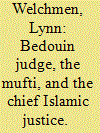

|
|
|
|
|
| Publication |
2009.
|
| Summary/Abstract |
This article examines competing legal frameworks in dispute resolution in the occupied territories, against the background of weakening central authority, bitter political rivalries, and increasing insecurity on the ground. Two case studies from 2005 are presented-a killing in Gaza and an attempted sexual assault in the West Bank-where the involved parties had recourse to three distinct but overlapping bodies of law, not all of which were part of the formal Palestinian legal system: statutory law, Islamic law, and customary (or tribal) law. The resolution of these cases, while shedding light on the intersection of local politics and alternative legal systems, underscores the challenges of forging a united legal system in a situation of occupation, weak government, and heterogeneous legal heritage.
|
|
|
|
|
|
|
|
|
|
|
|
|
|
|
|
| 2 |
ID:
132964
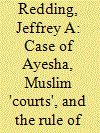

|
|
|
|
|
| Publication |
2014.
|
| Summary/Abstract |
This paper aims to challenge the disparagement of non-state Islamic systems of law that has established firm roots in contemporary rule of law ideology and practice around the world, from India to Ontario. In this respect, rule of law ideology has tended to ignore actual mechanics and procedures of law, not only in legal venues outside the state's direct control, but also in the state's courts themselves. With respect to non-state legal venues-and especially non-state Islamic legal venues-such ideology understands and describes the practices and procedures that it finds in these non-state venues as crude and underdeveloped at best, and illiberal and in violation of the rule of law at worst. While other scholarly work has vividly demonstrated the various transformations and mutations that any state's 'ideal legal procedure' experiences as it is put into real-world practice by a state's courts and judges, this paper makes a converse move. Using a case-study focused on the circumstances and experiences of an Indian Muslim woman, 'Ayesha', who recently used a Delhi dar ul qaza to exercise her Islamic divorce rights in India, this paper demonstrates how a non-state Islamic legal venue behaves in ways which are highly evocative of rule of law ideology's idealization of state courts and how they (should) operate procedurally. In doing so, this paper provides evidence for Partha Chatterjee's thesis as to how elite and subaltern domains-understood here to be embodied in both state and non-state legal venues, respectively-are products of 'mutually conditioned historicities'. In this case, the focus is on the state's conditioning of the non-state. As a result, rule of law ideology's state-oriented critique of the (Islamic) non-state is mistaken because, as this paper demonstrates, the non-state is produced in conversation with the state; one cannot critique the one (non-state) domain without realizing how that critique implicates the other (state) domain.
|
|
|
|
|
|
|
|
|
|
|
|
|
|
|
|
| 3 |
ID:
135007
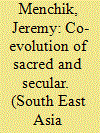

|
|
|
|
|
| Summary/Abstract |
While scholars of the Islamic revival have devoted attention to the increased prominence of Islamic law [the shari'a] in the once-secular public sphere, less attention has been paid to a countervailing trend. By mapping the evolution of Islamic law over the twentieth century, the author demonstrates that the shari'a is a product of decades of negotiations between Islamic institutions and more secular authorities including government ministers, doctors and social movements. This evolution suggests that secular authority and secular forms of knowledge have influenced but not displaced religious authority and religious forms of knowledge. The opposite is also true. This finding raises questions about the binary distinction between secular and sacred authority and suggests the co-evolution of religion and secularism in modern Muslim societies.
|
|
|
|
|
|
|
|
|
|
|
|
|
|
|
|
| 4 |
ID:
112122
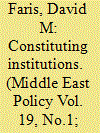

|
|
|
| 5 |
ID:
140457
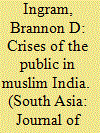

|
|
|
|
|
| Summary/Abstract |
This article argues that Sayyid Ahmad Khan (1817–98) and Ashraf ‘Ali Thanvi (1863–1943) were, respectively, exemplars of what I will call the liberal critique of custom on the one hand, and the Islamic legal critique of custom on the other. I argue that a range of overlapping semantic fields in their Urdu works—‘custom’ (rasm), ‘reform’ (islah), ‘decline’ (zawal, tanazzul) and ‘nation’ or ‘moral community’ (qawm), among others—opens up new lines of inquiry in comparing Aligarh and Deoband, typically treated as incommensurable in their views, as institutions and movements. I suggest, additionally, that ‘the public’ (‘amm) was a shared frame through which they envisioned implementing their respective projects. At the imagined centre of these publics, they located a new sort of Muslim: literate, self-regulating, self-fashioning, guided by rationality (‘aql) and free, above all, of the moral and social entanglements of ‘custom’.
|
|
|
|
|
|
|
|
|
|
|
|
|
|
|
|
| 6 |
ID:
099181
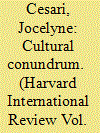

|
|
|
| 7 |
ID:
146536


|
|
|
|
|
| Summary/Abstract |
The democratization of politics has been accompanied by a rise of Islamic laws in many Muslim-majority countries. Despite a growing interest in the phenomenon, the Islamization of politics in democratizing Muslim-majority countries is rarely understood as a process that unfolds across space and time. Based on an original dataset established during years of field research in Indonesia, this article analyzes the spread of shari’a regulations across the world’s largest Muslim-majority democracy since 1998. The article shows that shari’a regulations in Indonesia diffused unevenly across space and time. Explanations put forward in the literature on the diffusion of morality policies in other countries such as geographic proximity, institutions, intergovernmental relations and economic conditions did not explain the patterns in the diffusion of shari’a regulations in Indonesia well. Instead, shari’a regulations in Indonesia were most likely to spread across jurisdictions where local Islamist groups situated outside the party system had an established presence. In short, the Islamization of politics was highly contingent on local conditions. Future research will need to pay more attention to local Islamist activists and networks situated outside formal politics as potential causes for the diffusion of shari’a law in democratizing Muslim-majority countries.
|
|
|
|
|
|
|
|
|
|
|
|
|
|
|
|
| 8 |
ID:
121797


|
|
|
|
|
| Publication |
2013.
|
| Summary/Abstract |
Empirical analyses of domestic legal traditions in the social science literature demonstrate that common law states have better economic freedoms, stronger investor protection, more developed capital markets, and better property rights protection than states with civil law, Islamic law, or mixed legal traditions. This article expands upon the literature by examining the relationship between domestic legal traditions and human rights practices. The primary hypothesis is that common law states have better human rights practices on average than civil law, Islamic law, or mixed law states because the procedural features of common law such as the adversarial trial system, the reliance on oral argumentation, and stare decisis result in greater judicial independence and protection of individual rights in these legal systems. We also examine how the quality of a state's legal system influences repression focusing on colonial legacy, judicial independence, and the rule of law. A global cross-national analysis of state-years from 1976 to 2006 shows that states with common law traditions engage in better human rights practices than states with other legal systems. This result holds when controlling for the quality of the legal system and standard explanations for states' human rights practices (economic growth, regime type, population size, military regime, and war involvement).
|
|
|
|
|
|
|
|
|
|
|
|
|
|
|
|
| 9 |
ID:
125298
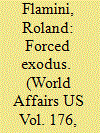

|
|
|
|
|
| Publication |
2013.
|
| Summary/Abstract |
In September, senior clerics from a dozen different Christian denominations all over the Middle East met in Amman, Jordan, for a conference organized by King Abdullah II. The subject was the crisis facing Christianity in the region, and what to do about it. Missing from the meeting were two prominent Arab prelates from Aleppo: Mar Gregorios Yohanna Ibrahim, the city's Syriac Orthodox bishop, and Metropolitan Boulos Yazigi, his Greek Orthodox counterpart. Both had been abducted by unidentified gunmen somewhere between Aleppo and Antioch in April, and their whereabouts were still unknown.
|
|
|
|
|
|
|
|
|
|
|
|
|
|
|
|
| 10 |
ID:
187137
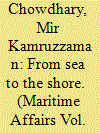

|
|
|
|
|
| Summary/Abstract |
When it comes to the maritime history of the Indian Ocean Region (IOR), there are few available textual resources and written pieces of evidence which can help undertake a cogent reconstruction. This article attempts to retrieve some of those maritime practices that prevailed among the mariners and sailors on the basis of a few available written documents, such as travellers’ accounts, Mughal court chronicles, European factory records and other written documents. Such historical reconstruction is important since, in the past few decades, the Indian Ocean has become significant object of study in its own right. The article seeks to recover “forgotten” oceanic histories of law or practices in the western IOR, and examine how these got institutionalised as admiralty law in India. More precisely, it focuses on the process of the transformation of maritime law from tradition to admiralty law in some detail.
|
|
|
|
|
|
|
|
|
|
|
|
|
|
|
|
| 11 |
ID:
121882
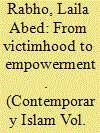

|
|
|
|
|
| Publication |
2013.
|
| Summary/Abstract |
This study features the voices of women who sued their husbands in the Shari'a courts, revealing the empowerment that resulted from learning their legal rights. The stories of some two hundred Palestinian Muslim women who appealed to the Shari'a courts in Jerusalem and Taibe during the years 2000-2003 formed the basis of this study. The women came to the courts to claim material support (nafaqa) from their husbands and to demand child support (hadane). Four major reasons why these women sued their husbands in court emerged from their stories, revealing familial, social, economic and even political circumstances that impinged on their lives.
|
|
|
|
|
|
|
|
|
|
|
|
|
|
|
|
| 12 |
ID:
137960
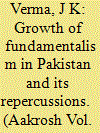

|
|
|
|
|
| Summary/Abstract |
The Islamic republic of Pakistan was created in the name of Islam, but Muhammad Ali Jinnah, the father of the nation, wanted a secular Muslim state and not a theocratic Islamic state controlled by fundamentalists.
|
|
|
|
|
|
|
|
|
|
|
|
|
|
|
|
| 13 |
ID:
119171
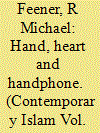

|
|
|
|
|
| Publication |
2013.
|
| Summary/Abstract |
The state implementation of Islamic law in the special autonomous region of Aceh (Indonesia) presents a complex and compelling case for examining some of the central themes of this special issue, particularly the attempt to understand the complex entanglements of secular nation states with contemporary religious movements. These dynamics are particularly energized in contemporary Aceh, where a state-directed project for the formal implementation of shari`a has been pursued alongside broader agendas for social reconstruction following the devastating 2004 tsunami and the subsequent end of decades of violent conflict between the 'Free Aceh Movement' (GAM) and the central Indonesian government. This article explores a heretofore un-examined source base - that of 'Text Messages (SMS) to the Editor' printed in a local newspaper - to gain new perspective on local debates over the role of Islam and official state structures in building a 'new Aceh'. This material presents a striking example of the complexity and contestation of popular discourses on Islamic law and society well beyond the realm of specialist spokesmen.
|
|
|
|
|
|
|
|
|
|
|
|
|
|
|
|
| 14 |
ID:
058003
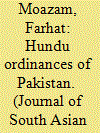

|
|
|
| 15 |
ID:
134375
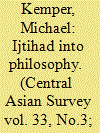

|
|
|
|
|
| Summary/Abstract |
Starting in 1960, authors of various Daghestani nationalities initiated a re-evaluation of the role of Islam in the history of Daghestan. An important historical personality to draw upon was Muhammad al-Quduqi, a Daghestani Islamic legal scholar of the late seventeenth and early eighteenth centuries. Quduqi was known for his sympathies towards ijtihad (Islamic legal reasoning by analogy) and for his call to replace customary law by Islamic law. This article studies how Quduqi was brought back into Soviet discourse in 1960, and how his advocacy for ijtihad was subsequently interpreted in Marxist terms as a quest for philosophy, rationalism and progress, with secularizing terms drawn from the discourse of Daghestani Jadids of the 1920s and 1930s. A comparison is then made with Soviet Tatarstan, where Marxist historians constructed a similar autochthonous trajectory of Tatar-Islamic progress and enlightenment. In both cases, Islamic concepts were taken out of context and used for the construction of a secularized national Muslim cultural heritage (miras) that would prepare the ground for socialism – with the difference that in Daghestan, this Muslim Mirasism was multi-ethnic in character.
|
|
|
|
|
|
|
|
|
|
|
|
|
|
|
|
| 16 |
ID:
108364
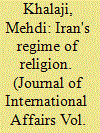

|
|
|
| 17 |
ID:
050093
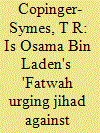

|
|
|
| 18 |
ID:
138243
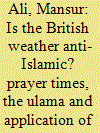

|
|
|
|
|
| Summary/Abstract |
In the absence of clear-cut guidance from the primary sources of the shari’a, how do Muslim scholars derive a workable religious praxis in changing circumstances and which authorities do they invoke in the process? This article explores possible answers to these questions by conducting a detailed analysis of a debate between two groups of Deobandi scholars in Britain over establishing the correct time for the commencement of morning (Fajr) and the onset of fasting for Ramadan. I argue that besides the primary sources, these Deobandi scholars invoke alternate forms of extrascriptural authority such as the weight of precedence deriving from the akabir (elders) of the Deobandi tradition, as also their reliance on modern scientific knowledge. The article highlights the complex interplay of factors which determines the way that Muslims in Britain negotiate the practice of their religion in new sociocultural milieu and the way they attempt to incorporate these changes within the parameters of an established religious discourse.
|
|
|
|
|
|
|
|
|
|
|
|
|
|
|
|
| 19 |
ID:
076635
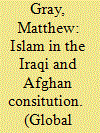

|
|
|
| 20 |
ID:
151448
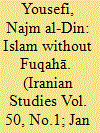

|
|
|
|
|
| Summary/Abstract |
This paper seeks to advance the existing scholarship on Persian secretary and belles-lettrist, ʿAbd Allāh Ibn al-Muqaffaʿ (d. 139/757) and his Risāla fī ’l-Ṣaḥāba (Epistle Concerning the Entourage). It argues that the Risāla, addressed to the second Abbasid caliph al-Manṣūr, set out to tackle the political ills of the caliphate, especially the crisis of political legitimacy. As the first documented articulation of the Islamic polity, the Risāla made a series of recommendations, including a proposal for legal codification that attempted to reinvent the caliphate by reuniting the institution's political and legal authority at the expense of private jurists (fuqahāʾ). The paper illustrates how Ibn Muqaffaʿ’s solution relied on a creative integration of Iranian and Islamic ideas of statecraft and legitimate rule. Ironically, this creative integration may have played a part in the Risāla’s failure to garner necessary support to effect change.
|
|
|
|
|
|
|
|
|
|
|
|
|
|
|
|
|
|
|
|
|